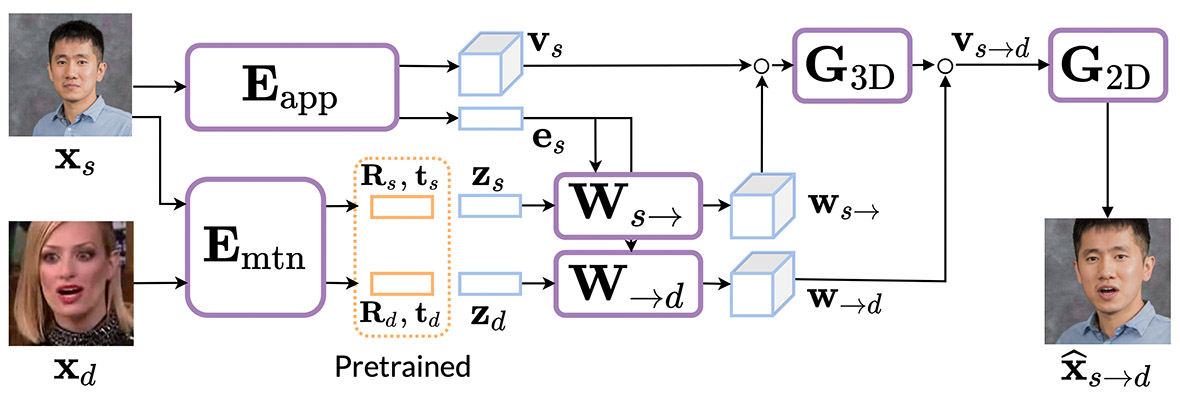Implementation of Megaportrait using Claude Opus
All models / code is in model.py
(beware when working with claude if you paste copyright ResNet code - it will spit the dummy - especially on .)
memory debug
mprof run train.pyor just
python train.py- Save / restore checkpoint) specify in config ./configs/training/stage10base.yaml to restore checkpoint
- auto crop video frames to sweet spot
- tensorboard losses
- LPIPS
- additional imagepyramide from one shot view code for loss
warp / crop / spline / remove background / transforms
- Total Videos: 35,000 facial videos
- Total Size: 40GB
for now - to simplify problem - use the 4 videos in junk folder. once models are validated - can point the video_dir to above torrent
# video_dir: '/Downloads/CelebV-HQ/celebvhq/35666'
video_dir: './junk'the preprocessing is taking 1-2 mins for each video - I add some saving to npz format for faster reloading.
You can download the dataset via the provided magnet link or by visiting Academic Torrents.
magnet:?xt=urn:btih:843b5adb0358124d388c4e9836654c246b988ff4&dn=CelebV-HQ&tr=https%3A%2F%2Facademictorrents.com%2Fannounce.php&tr=https%3A%2F%2Fipv6.academictorrents.com%2Fannounce.php
- Description: Responsible for creating the foundational neural head avatar at a medium resolution of (512 x 512). Uses volumetric features to encode appearance and latent descriptors to encode motion.
- Components:
- Appearance Encoder (
Eapp): Encodes the appearance of the source frame into volumetric features and a global descriptor.class Eapp(nn.Module): # Architecture details omitted for brevity
- Motion Encoder (
Emtn): Encodes the motion from both source and driving images into head rotations, translations, and latent expression descriptors.class Emtn(nn.Module): # Architecture details omitted for brevity
- Warping Generators (
Wsrc_to_canandWcan_to_drv): Removes motion from the source and imposes driver motion onto canonical features.class WarpGenerator(nn.Module): # Architecture details omitted for brevity
- 3D Convolutional Network (
G3D): Processes canonical volumetric features.class G3D(nn.Module): # Architecture details omitted for brevity
- 2D Convolutional Network (
G2D): Projects 3D features into 2D and generates the output image.class G2D(nn.Module): # Architecture details omitted for brevity
- Appearance Encoder (
- Description: Enhances the resolution of the base model output from (512 \times 512) to (1024 \times 1024) using a high-resolution dataset of photographs.
- Components:
- Encoder: Takes the base model output and produces a 3D feature tensor.
class EncoderHR(nn.Module): # Architecture details omitted for brevity
- Decoder: Converts the 3D feature tensor to a high-resolution image.
class DecoderHR(nn.Module): # Architecture details omitted for brevity
- Encoder: Takes the base model output and produces a 3D feature tensor.
- Description: A distilled version of the high-resolution model for real-time applications. Trained to mimic the full model’s predictions but runs faster and is limited to a predefined number of avatars.
- Components:
- ResNet18 Encoder: Encodes the input image.
class ResNet18(nn.Module): # Architecture details omitted for brevity
- Generator with SPADE Normalization Layers: Generates the final output image. Each SPADE block uses tensors specific to an avatar.
class SPADEGenerator(nn.Module): # Architecture details omitted for brevity
- ResNet18 Encoder: Encodes the input image.
- Description: Computes the gaze and blink loss using a pretrained face mesh from MediaPipe and a custom network. The gaze loss uses MAE and MSE, while the blink loss uses binary cross-entropy.
- Components:
- Backbone (VGG16): Extracts features from the eye images.
class VGG16Backbone(nn.Module): # Architecture details omitted for brevity
- Keypoint Network: Processes 2D keypoints.
class KeypointNet(nn.Module): # Architecture details omitted for brevity
- Gaze Head: Predicts gaze direction.
class GazeHead(nn.Module): # Architecture details omitted for brevity
- Blink Head: Predicts blink probability.
class BlinkHead(nn.Module): # Architecture details omitted for brevity
- Backbone (VGG16): Extracts features from the eye images.
train_base(cfg, Gbase, Dbase, dataloader): Trains the base model using perceptual, adversarial, and cycle consistency losses.def train_base(cfg, Gbase, Dbase, dataloader): # Training code omitted for brevity
train_hr(cfg, GHR, Dhr, dataloader): Trains the high-resolution model using super-resolution objectives and adversarial losses.def train_hr(cfg, GHR, Dhr, dataloader): # Training code omitted for brevity
train_student(cfg, Student, GHR, dataloader): Distills the high-resolution model into a student model for faster inference.def train_student(cfg, Student, GHR, dataloader): # Training code omitted for brevity
- Data Augmentation: Applies random horizontal flips, color jitter, and other augmentations to the input images.
- Optimizers: Uses AdamW optimizer with cosine learning rate scheduling for both base and high-resolution models.
- Losses:
- Perceptual Loss: Matches the content and facial appearance between predicted and ground-truth images.
- Adversarial Loss: Ensures the realism of predicted images using a multi-scale patch discriminator.
- Cycle Consistency Loss: Prevents appearance leakage through the motion descriptor.
- Description: Sets up the dataset and data loaders, initializes the models, and calls the training functions for base, high-resolution, and student models.
- Implementation:
def main(cfg: OmegaConf) -> None: use_cuda = torch.cuda.is_available() device = torch.device("cuda" if use_cuda else "cpu") transform = transforms.Compose([ transforms.ToTensor(), transforms.Normalize([0.5], [0.5]), transforms.RandomHorizontalFlip(), transforms.ColorJitter() ]) dataset = EMODataset( use_gpu=use_cuda, width=cfg.data.train_width, height=cfg.data.train_height, n_sample_frames=cfg.training.n_sample_frames, sample_rate=cfg.training.sample_rate, img_scale=(1.0, 1.0), video_dir=cfg.training.video_dir, json_file=cfg.training.json_file, transform=transform ) dataloader = DataLoader(dataset, batch_size=4, shuffle=True, num_workers=4) Gbase = model.Gbase() Dbase = model.Discriminator() train_base(cfg, Gbase, Dbase, dataloader) GHR = model.GHR() GHR.Gbase.load_state_dict(Gbase.state_dict()) Dhr = model.Discriminator() train_hr(cfg, GHR, Dhr, dataloader) Student = model.Student(num_avatars=100) train_student(cfg, Student, GHR, dataloader) torch.save(Gbase.state_dict(), 'Gbase.pth') torch.save(GHR.state_dict(), 'GHR.pth') torch.save(Student.state_dict(), 'Student.pth') if __name__ == "__main__": config = OmegaConf.load("./configs/training/stage1-base.yaml") main(config)
rome/losses - cherry picked from https://github.com/SamsungLabs/rome
wget 'https://download.pytorch.org/models/resnet18-5c106cde.pth' extract to state_dicts
git clone https://github.com/Tobias-Fischer/rt_gene.git
cd rt_gene/rt_gene
pip install .